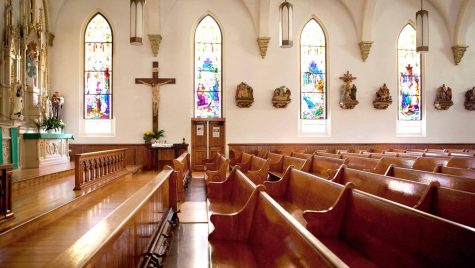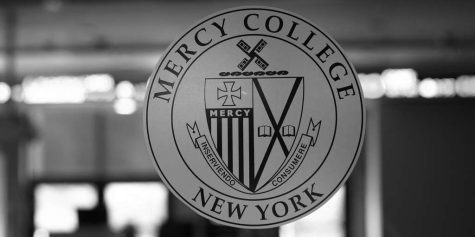‘Whatever It Takes’: How Mercy Moved Online
Amid a global pandemic, COVID-19 has flipped the Mercy College community upside down.
Of all the industries to be shaken up from the ongoing COVID-19 crisis, perhaps none has faced, or faces, a more confusing path than the education world. Going from a mostly in-person environment to an only online one, entire syllabuses have been thrown out to accommodate the change the world is facing.
“Once we started having confirmed cases of COVID-19 in the United States, and then especially in New York, I realized that this global health crisis would affect our school’s operations. What was most surprising was how quickly things escalated.”
The aforementioned words are from Dr. Eric Martone, the Interim Dean of the School of Education, and an Associate Professor of History/Social Studies for Mercy College. He is one of the many within the school’s community that had to deal with the rapid change that has been brought from COVID-19.
While his students were focused on learning the differences between Russian Imperialism and Imperialist Russia, in the snap of one’s fingers, many students went from in-class one day, to being sent home for two weeks the next, to being home for the foreseeable future shortly after.
Danielle Juste, a senior at Mercy, is one of the many whose finale to their college career has ended in less than ideal circumstances. Regardless, she’s keeping her head high. “It’s been a tough transition, but it is something we all have to do. Ending the semester so abruptly was shocking, but it was expected. We can only hope things will eventually get better.”
But despite the monumental task that Mercy College officials had to face, they, much like the students, had to accept these changes. But they had to make it work for everyone, including all professors and students.
Tesse Santoro, the Head Librarian of the Mercy College’s Dobbs Ferry campus, is one of the key figures behind the transition. “People often think it’s a magic process. It takes an hour just to close the library. I need to turn off the lights and get people out. But this is different.”
While the library was one of the last facilities that remained open on campus, it, like most academic institutions in the United States, has been forced to temporarily close its doors.
Despite not expecting a global pandemic to sweep many off their feet, Santoro has had the library prepared for modern problems such as this for a while. “I’ve spent years getting the library ready. I pushed for the ebook collection we have now. We have more ebooks than real books. Our journals and databases are all electronic. Our collection has all moved online.”
This has allowed students to remain able to access vital sources through the various databases the college provides. A key for Santoro now is letting students know that they’re available to help.
“The first question we were getting was ‘Where are the librarians?’ We’re on chat, we need everyone to know that,” stressed Santoro. “We wanted to let everyone know that we’re here. We have guides to walk you through problems, and if you can’t find anything, I have my email on the bottom. I’m the English literature lady. I can help you!”
Through various guides on the Mercy website, which the library team has committed to reworking over the previous few weeks, including the Virtual Library Service, students can speak with librarians over various modes and still access much of what was already at their helm.
But perhaps the most radical change facing many is the transition to an exclusively online setting. As Martone points out, Mercy has been offering online courses for several years now, with most programs registered online.
“Most of our students complete their programs fully online or through a mixture of in-person and online courses. As a result, nearly all the professors in my school have at least basic knowledge of how to teach online and nearly all the students in my school have some level of experience with online learning.”
This, according to Martone, made the transition a “small one rather than a great leap.”
Despite this, he shared some challenges faced by him and his school. For example, something like a workshop on topics like school violence prevention, child abuse identification, and bullying, which Mercy College is a New York State-approved provider of, typically requires in-person sessions to be completed.
“As we have never offered these online before, we had to overcome some obstacles to do this. A unique challenge was that one of these workshops, known as the DASA workshop, has a specific three-hour face-to-face requirement. Until the state temporarily suspended this requirement—which they eventually did—we had to cancel some of these workshops.”
But behind academic problems, there are also the concerns of the other aspects most deal with daily, such as work, family, and technological issues — he doesn’t forget these when naming off the challenges faced.
“They have been thrust into this situation suddenly and are therefore even more challenging,” stated Martone. “Some of them have had family members who have tested positive for COVID-19 or who have lost family members because of COVID-19. A few have tested positive themselves. As a result, keeping our students engaged has been challenging. Our school typically has small class sizes, which enables us to give our students individualized attention to keep tabs on how they are doing. PACT has also been helpful in reaching out to struggling students.”
He also mentioned the implementation of the Credit Earned/No Credit, which was another policy implemented by the school in response to the distractions faced by students during these times.
Beyond everything going on, both Martone and Santoro emphasized the importance of helping everyone during these times. “The library will be busy. Students will need to get their work done, and they will need help. Everyone has their story, and it’s tough. Hopefully, students will stay with it. We’re here to help. Whatever it takes,” stated Santoro.
For students like senior Ryan Dillion, these efforts have not gone unnoticed. “So far professors have been very understanding with the unprecedented situation at hand. Without the readily available resources one has on campus, it has definitely become a little harder to complete assignments on short notice, but not impossible.
“In the end, we’re all in this together and I know the school is doing their best to accommodate the needs of students while trying to maintain academic success.”
But in the light of tragedy and anger, Santoro points out that New Yorkers have been here before, and that nothing will change the fact that they’ll put through this together.
“I went through Sandy, 9/11 — we’ll get through it. New Yorkers are built differently. We get through depressions and wars, and people need time to figure out where to go next. It’s tough. But disaster often brings the best in people. That’s also what makes this so weird. We can’t do this together. It’s hard on people.”

Steven Keehner was the Managing Editor of the greatest publication on the Hudson.
Hailing from the mediocre Town of Oyster Bay, New York, he enjoys...













